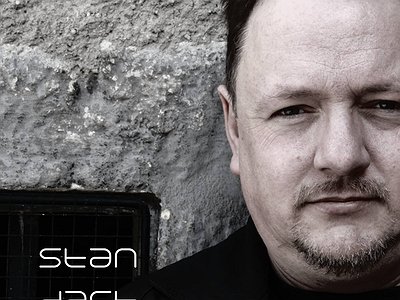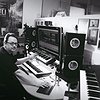Part 1
Name: Richard Hasiba
Nationality: Austrian
Occupation: Composer, Producer
Current Release: Ecclesia, available at the Stan Dart Musicstore
Recommendations:
Bladerunner Soundtrack (25th Anniversary Edition) by Vangelis: It contains unheard music from the movie and an extra disc with new tracks inspired by the movie. Electronic music at its best!
Interstellar Soundtrack by Hans Zimmer: Hans writes songs like no one else. Intense and full of dramatic elements still containing melodies of an incomparable elegance. Interstellar goes far beyond the concept of a soundtrack, it´s almost a confession of faith - made with music.
Website / Contact: If you enjoyed this interview with Richard Hasiba aka Stan Dart, visit his website to listen to extracts from his albums and order his music directly from him.
When did you start writing/producing music - and what or who were your early passions and influences? What what is about music and/or sound that drew you to it?
When I was a teenager, I worked with a Yamaha Keyboard and made my first attempts to record my own tracks on tape, influenced by the music at this time (Jan Hammer, Paul Hardcastle, New Order, Vangelis, Depeche Mode and all the shimmering bands of the 80ies). It was the electronic sound that fascinated me from the beginning.
A lot of tapes later (including many “strange” attempts to create mixtapes too), I felt that the technological progress wasn´t ready for me to use it. Instead, I started to listen to music in a very intense way, spending a lot of money to collect all kinds of 12inch vinyls and records/CDs of my favourite artists.
It was back in 2009 when family circumstances went beyond control. It was the first time that death stepped into my life. Now, the “inner call” for creating my own music (which was still there) was a way to handle these feelings of desperation and sadness. Due to the fact, that electronic music programs became quite easy to use (on your PC), I started to compose. Maybe that´s the reason why my songs have this kind of darkness at their core …
For most artists, originality is first preceded by a phase of learning and, often, emulating others. What was this like for you? How would you describe your own development as an artist and the transition towards your own voice? What is the the relationship between copying, learning and your own creativity?
I never intended to copy the style of an artist, as this wouldn´t create something new. Sounding like someone else is nice, but there´s already someone with this style. So what sense would it make to copy that sound? Nobody would care.
I listened to a lot of music in the 80ies – pop, easy listening, electronic music and soundtracks, and I think the way Vangelis uses the technology was teaching me involuntarily the way I use sounds these days. His combination of electronic and classic elements was groundbreaking for me. Still, “Chariots of fire” & “Bladerunner are one of the best examples of soundtracks made with electronic instruments.
Also, listening to Jan Hammer´s music for “Miami Vice” influenced me a lot. It was there that I realised how important it is to create a solid and simple rhythm as a base for a good song.
Therefore, I played a lot of the hits from that time at home, to discover HOW they were made, WHAT their secret was and WHICH instruments made them sound so magically (which was hard to discover in times when there was no Internet). Those attempts never reached the public, as they were only my way to understand electronic music.
But later on – and that sounds a bit paradoxical – I wrote some cover versions too! I´m great fan of German artist Schiller, and it was my intention to re-create some of his songs in my own way (as I never had the chance to get some stems from him for remixing). Writing these covers taught me a lot about the structure of songs: How to start, which effects are suitable, how to use these effects in an economical way in order to prevent distraction from the message of the song … All these experiences helped me to create my style - my musical identity.
What were your main compositional- and production-challenges in the beginning and how have they changed over time?
Well, in the beginning :-) …
I started with an old Windows XP PC with less hardware resources. I worked in my bed room (at times of day, where everybody else was already “offline”) . To write a track I had to be very patient. 10 Stems for a project – that´s all that PC could handle. I had to export the stems into a wave file – open a new project – import the wave and add some 9 other stems, and so on … so it took a while back then to finish a track.
I think these limitations formed my economical way of producing music, using only the resources I really required in as less stems as possible. Still, this is a basic principle for me, although I have now much more resources, and therefore I could create vast projects – but what for? :-)
What was your first studio like? How and for what reasons has your set-up evolved over the years and what are currently some of the most important pieces of gear for you?
The Past:
Windows XP PC (4GB RAM and a single 500 MB hard drive)
No external soundcard – I had to use the onboard sound chip
A small 17 Inch Screen
No studio speakers (cheap headphones, where you have to stop working every 30 minutes before becoming deaf)
No professional music software – except an old version of Magix Musikmaker”
A few freeware VST tools like “TS 808” (TR808 emulation) or the fantastic synths “Alpha-Ray” and “Etheral Padz”
The Present:
Fujitsu Workstation (OS: Win10, 32 GB RAM, 4x 1TB dard drives)
External FireWire Soundcard (Behringer FCA1616)
Audio Control Monitor (Behringer Control2USB)
DAW/Plugin Control (Novation Zero SL MK II)
Miditech MIDIface 4x4
Synthesizer Korg M1
Synthesizer Korg Poly 800
Synthesizer Roland Juno 106
Synthesizer Korg Kaossilator
Synthesizer Yamaha QY 10
DAW Magix Samplitude Pro X 3 Suite
Native Instruments Komplete 10
Alchemy
Spectrasonics
More than 200 freeware tools, some of which I've used since “the good old days”
[Read our feature on the Juno 106]
I think every musician is constantly looking for new tools to enhance his way of creating music. I prefer using virtual synthesizers (they sound fine and don´t equire a place to set up) but also, I love my Roland for its warm preset sounds which can be adapted quite easily. It´s hard for me to tell which of my tools I prefer most. Alchemy (which is now only available for Mac Users) is a fantastic tool too, which I use in nearly every production. But to be honest Samplitude is my most important software. No other DAW is so flexible when it comes to create a “home” for your track . Also, they provide a lot of highend plugins. I tried Ableton, Reaper and FL and went back to Samplitude!
How do you make use of technology? In terms of the feedback mechanism between technology and creativity, what do humans excel at, what do machines excel at?
A machine is only as good as the people creating and using them in order to full fill a certain goal. Working with synthesizers and computers doesn´t mean that these machines write the songs; they only produce a sound. It´s the human who picks up these sounds and creates something out of it. The result will be different depending on his sklls. But in the end it is the human not the machine who wrote the track.
A well programmed algorithm of a plugin can help you to create the desired sound. It can support you on your way and best programmed tools (hard- and software) can inspire you and raise your production to a level which you never thought being able to reach (I think this is a basic principle which can be used for every field of technology).
Production tools, from instruments to complex software environments, contribute to the compositional process. How does this manifest itself in your work? Can you describe the co-authorship between yourself and your tools?
The idea for a song is still coming from my mind, influenced by story, a picture, a song, a book, a movie or whatever. When the idea is strong enough (some disappear within a few moments and can´t be held until I enter my studio), I mainly start with a piano sound, to write down the idea of the melody.
A piano is a very pure and unique sound to me and most of the time the best way to start a track. In the end it doesn´t have to be a piano sound – it could turn out, that a guitar or distorted, phased synth-sound fits the original idea better. But these changes happen at a certain time almost automatically: It´s the song which tells me how to go on. Yeah, I know that sounds strange, but it´s the best way to explain what I call the “pure flow” effect when working on tracks.
There´s only one limitation I maintain: After 3 days of working on a track with no results or the chance to see a structure ahead, I delete the whole project and start again.






